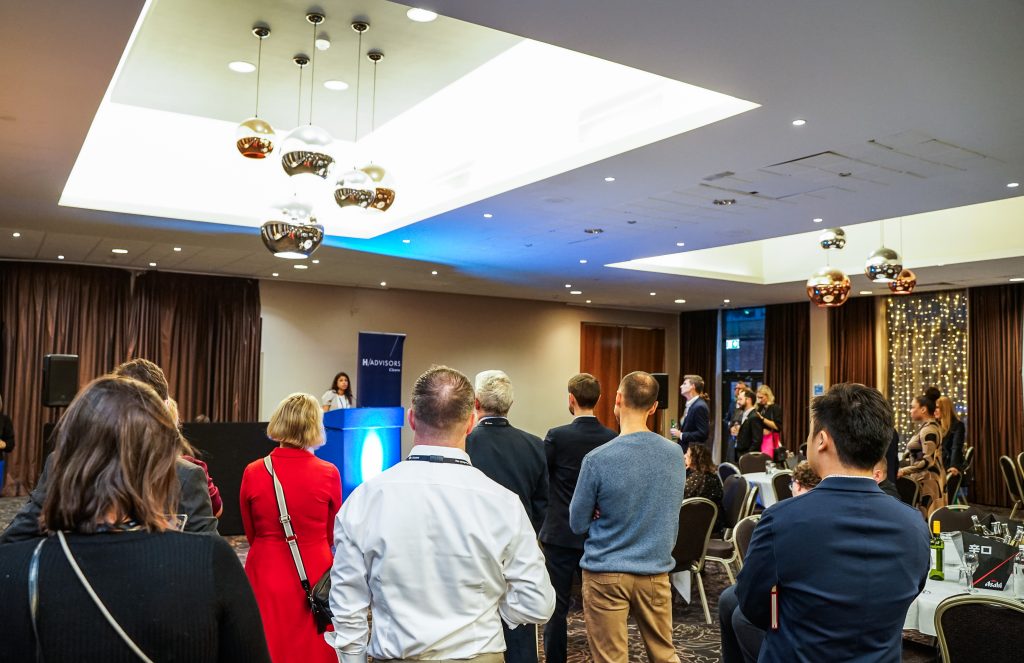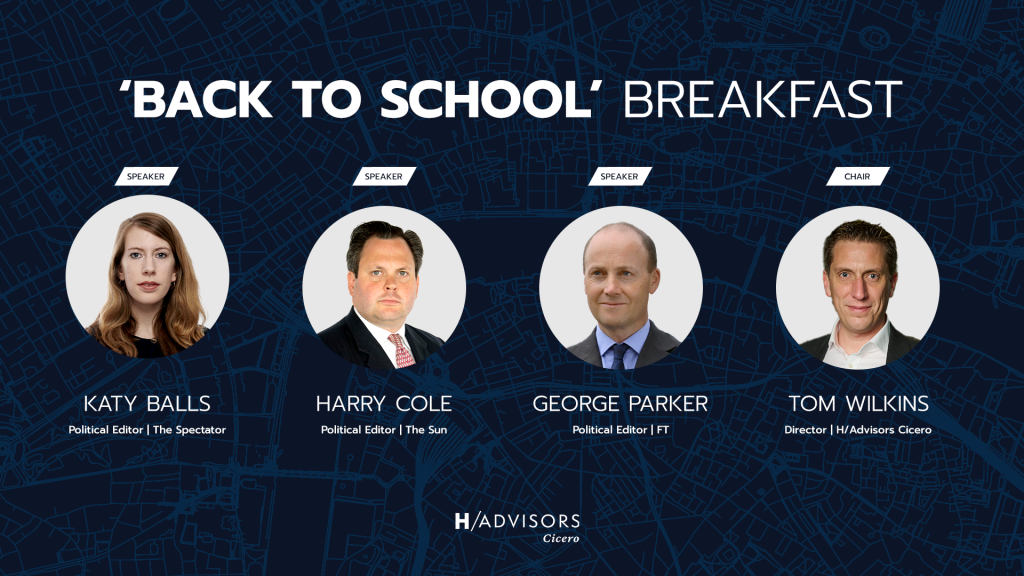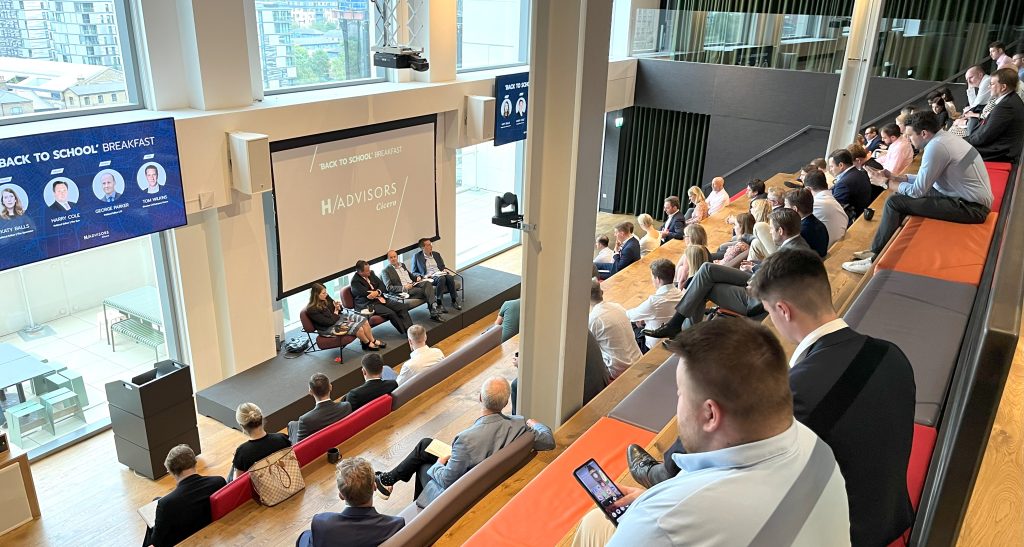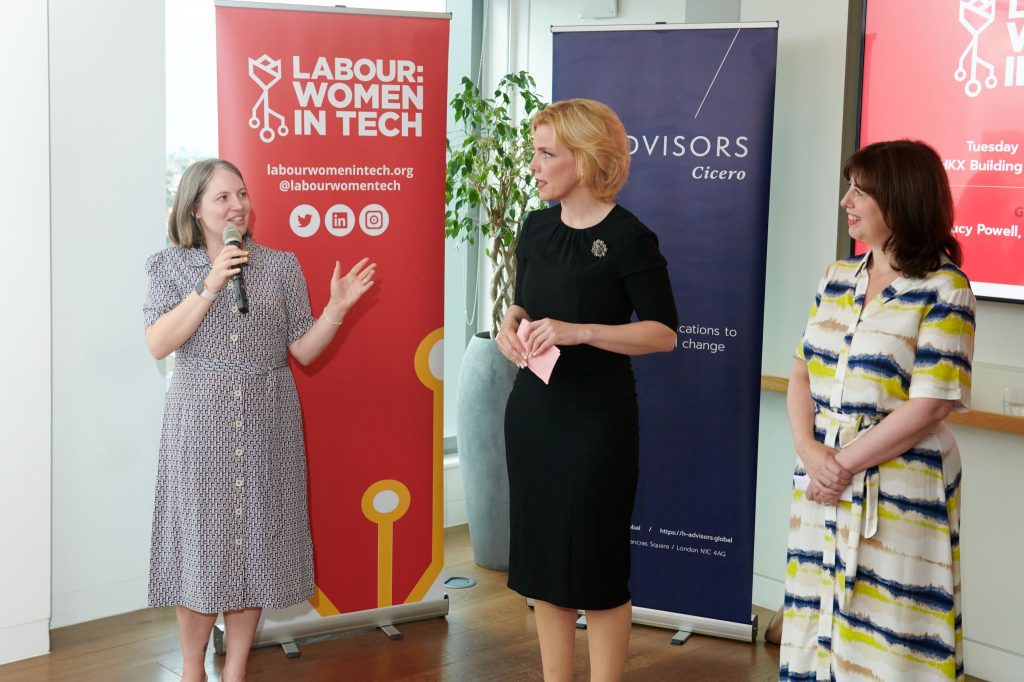Scottish Labour celebratory in Liverpool as SNP anxiously head for Aberdeen
by Simon Fitzpatrick
13 October 2023
The party conference carnival has departed Liverpool and will make its next and final stop in Aberdeen, as the baton passes from Labour to SNP.
The Labour gathering was comfortably the most upbeat and energetic I have been to in my dozen years of conference attendance, and nowhere was this more evident than at the Scottish Labour events. Michael Shanks, Labour’s newest MP, received rapturous applause each time he walked into a room and his commanding win in Rutherglen & Hamilton West has clearly given Scottish Labour a major shot in the arm. After so many setbacks, this is a party that has its confidence back.
Labour’s path to election victory could be through Scotland
Dame Jackie Baillie, Scottish Labour’s deputy leader who ran the Rutherglen operation, informed audiences that having started the year with a list of six Scottish Westminster target seats, this has now grown to 28 credible targets, with more still on her “watchlist”. Speaking to Scottish PPCs, those in seats with similar demographics to Rutherglen can now clearly see a path to victory, but even those in notionally less promising areas for Labour feel that the growing sense of momentum could give them a chance to compete.
Everyone who had been active on the ground in Rutherglen spoke of the particular impact of Anas Sarwar on the doorstep. Like his party he has grown in confidence and seems to enjoy an easy rapport with the voters he meets. The other common theme emerging from campaigners in the seat was that independence did not register highly as an issue amongst voters. Instead, the cost of living and concern at NHS waiting lists were the most salient issues. Baillie also believes that Labour’s ‘new deal for working people’ – including a ban on zero hours contracts, an increased living wage and improved access to rights and protections at work – was a major selling point for her party. Expect it to be a significant focal point of the party’s campaign in Scotland.
Keir Starmer knows how important the Scottish fightback is to his chances of securing a majority. It was striking how long the section on Scotland was in his keynote speech and how frequently GB Energy – the new publicly owned energy company he plans to establish in Scotland – was mentioned. Starmer will regard the whole conference as a real success, but without doubt the Scottish dimension will have been one of the most pleasing aspects of all.
And the good news didn’t stop there. On Thursday morning news broke that East Kilbride’s SNP MP, Dr Lisa Cameron, had defected to the Conservative Party. Cameron cited the “toxic” culture in the SNP Westminster group, with whom her relations soured in the wake of the sexual harassment allegations against former Chief Whip Patrick Grady. This is just the latest in a series of internal rows in the SNP, from the suspension of Fergus Ewing MSP to the resignation of the SNP whip by Angus MacNeil MP. While the Tories are the immediate beneficiary of a new MP in this instance, it will be Labour who will have their eyes on the seat next year.
SNP friction going into their conference
This is the backdrop against which Humza Yousaf will oversee his first party conference as leader. His party is fractious, with some believing a stronger push towards independence is required, while others believe constitutional debate should take a backseat in favour of the day-to-day issues voters in Rutherglen highlighted.
Which way will Yousaf go? He gave some indication in a pre-conference interview with the New Statesman in which he said his party has spent too long “navel-gazing” about the process around independence. Voters “do not view it as being meaningful to their lives when they can’t pay their mortgage or their heating bill”, he added. Yousaf also acknowledged a perceived “credibility gap” between the SNP’s rhetoric and their record of delivery: “People have to believe we can deliver with the powers of devolution and then imagine what we can do with the powers of independence.”
This sounds very much like the language of someone who believes the central mission of the SNP to achieve independence will have to take a temporary back seat, in favour of a greater focus on bread-and-butter issues.
And yet, a conference motion in Yousaf’s name would commit the party to opening negotiations to “give democratic effect” to Scotland becoming an independent country in the event that the SNP wins the most Scottish seats in Westminster next year.
It is not immediately obvious how Yousaf will reconcile these two seemingly contrasting positions. If he cannot chart a way through them in Aberdeen he may find his party losing yet more ground.
This article was written by Simon Fitzpatrick, our Glasgow-based Director in the UK Public Affairs team. If you would like to speak with Simon about Scottish politics or policy, please do get in touch.
12 October 2023
As Labour Party Conference drew to a close this week, Alice Perry, Cicero UK Director – Public Affairs and former Chair of Labour NEC, shares her insights on what unfolded in Liverpool and what this means for the Labour Party going forward.
This excerpt is part of the full analysis the H/Advisors Cicero team put together for our clients on Labour’s vision for the country and policy platform. For the full report get in touch.
From protest to power
The contrast between the Labour Party Conference in the Corbyn years and the Labour Party Conference in 2023 is profound. Part of Labour’s electoral strategy will be to demonstrate to the country that it is “safe” to vote Labour. The Party used Conference as a platform to show how Labour has reconnected with the concerns of ordinary working people, is on their side and has moved from being a party of protest to a party ready for power.
Showcasing General Election candidates
The Conference was a forum to showcase Labour’s prospective parliamentary candidates (PPCs). Establishing the PPCs within their local constituencies is crucial to winning seats from incumbent Conservative MPs. PPCs made speeches from the platform addressing local concerns and priorities, which were clipped for social and regional media. PPCs also attended training and briefings to ensure that both MPs and PPCs stay disciplined and on message.
5 Missions to 5 Pledges
At the end of Keir Starmer’s speech, Labour staff were handing out leaflets outlining 5 pledges. These pledges were linked to Starmer’s 5 Missions but designed to appeal more directly to voters and signifies a new phase in the Party’s policy communications. Labour pledged to get Britain building, switch on Great British Energy, get the NHS back on its feet, restore law and order and break down barriers to opportunity. Conference also passed Labour’s National Policy Forum final documents, containing the narrative and broad direction of travel of a Keir Starmer Government.
Pro-business, pro-worker
This was one of Labour’s biggest-ever conferences in terms of commercial visitors, with Monday’s business day selling out in record time. Over the last year, Labour has been heavily investing in their business engagement and outreach as part of the strategy to rebuild credibility and public confidence and to build relationships across business and industry as part of preparations for a potential Labour Government. Alongside this, the shadow cabinet voiced their support for plans to put Labour reforms and improving workers’ rights at the heart of their pro-business, pro-worker agenda.
Winning Scotland
The mood within the secure zone was generally relaxed and focused rather than triumphant, but mentions of Rutherglen and Hamilton West were greeted with big cheers. Starmer’s team recognise that the smoothest route to a Labour Government runs through Scotland. It has taken Scottish Labour a long time to recover from the 2015 General Election wipeout, but belief is growing that Labour is turning a corner and can become the largest party in Scotland.




Shadow City Minister Tulip Siddiq MP spoke to attendees at our Labour Conference drinks event
For our full analysis on Labour’s Conference, its policy proposals and what they mean for business, get in touch Alice.Perry@h-advisors.global.
11 September 2023
This week we hosted our annual ‘Back to School Breakfast’ event, with a brilliant panel of speakers looking ahead to the new Parliamentary term in Westminster, following a quieter-than-usual Summer Recess.
We were joined by political editors Katy Balls of The Spectator, Harry Cole of The Sun, and George Parker of the Financial Times, each giving their take on what to expect from the legislative and political agenda in the year ahead, as well as the key dividing lines between the Government and Opposition parties as we run up to the next General Election.

The panel was chaired by H/Advisors Cicero’s Tom Wilkins, who steered the discussion through a range of pressing public affairs issues: from Labour’s chances of returning to Government in the next General Election to when that vote might take place; Rishi Sunak’s uphill task of holding onto his job and the other issues the Tories face ahead of Party Conference Season, including (but not limited to) the recent RAAC debacle in UK schools.
Attendees also had the chance to put questions to the panel.
For a full analysis of the return to Westminster read our ‘Back to School Special’ below, and contact James.vanderGraaf@h-advisors.global for what to expect in public affairs in the coming months.

7 September 2023
As Labour’s much anticipated reshuffle draws to a close, here are four things to note and consider when engaging with Labour ahead of the General Election (expected to take place in Autumn 2024).
1. Winning those “hero voters”
Labour’s reshuffle was deliberately timed to coincide with the arrival of new Chief of Staff, Sue Gray, and ahead of Labour Party Conference in Liverpool in October. It offers a new-look Shadow Cabinet to project the image of a government-in-waiting and reassure voters that there is no risk to voting Labour. In some cases, polished media performers have been promoted ahead of Starmer loyalists from his original leadership campaign, which is another signal that Keir Starmer is placing heavy emphasis on electability, professionalism and credibility. Labour’s election strategy also puts a high value on winning the “hero voters” in the key marginal constituencies that will determine the outcome of the next General Election. These constituencies include commuter towns and former industrial heartlands in England. Labour is also aware that winning back seats in Scotland is crucial to winning a majority. Policies will be framed around the priorities of these voters, so, when engaging with Labour, organisations should consider framing their own messaging and priorities to align with this focus.
2. Political thinking driving the policy agenda
A lot has been made of Blairites occupying key positions in Labour’s Shadow Cabinet, with some commentators suggesting there are more Blairites now than even in any of Blair’s own cabinets. It is certainly true that MPs like Wes Streeting, Ian Murray and Liz Kendall proudly and defiantly flew the flag for Blairism during the Corbyn years, and the Tony Blair Institute is now seen as one of the most influential left-wing thing tanks in Starmer’s Labour Party. However, it is also important to remember that there are other political philosophies driving Labour’s policy agenda.
There are five Labour and Co-operative MPs in the Shadow Cabinet, including Jonathan Reynolds, a key member of Starmer’s close circle. The Co-operative Party will have their own General Election manifesto, with key policy asks related to areas such as business and financial services. Furthermore, a number of MPs also come from the communitarian left and engage thoughtfully with the Blue Labour agenda, which is focused on winning back voters in traditional working-class heartlands.
The ”soft left” and trade union-left MPs like Angela Rayner, Anneliese Dodds, Ed Miliband and Louise Haigh continue to occupy key roles too. The nature of Labour’s formal policy process gives voice to a variety of party stakeholders, meaning that Labour’s manifesto will be a pitch to the centre-ground, but will be driven by more politically diverse ideas than just being a repeat of the 1990s. Labour has already announced a wide range of policies – the challenge will be what gets prioritised and this is where the political make-up of the Shadow Cabinet could be key.
3. Next steps for policy development
Shadow Cabinet members will need to get up to speed on new policy areas very quickly. Labour has a formal policy process, outlined in the Party rulebook, and various Shadow Cabinet members also co-chair Policy Commissions and are responsible for developing policy. They also have a role in pushing Keir Starmer’s policy platform through the Party. The National Policy Forum meeting in July agreed the general policy narrative and direction of travel, with those positions agreed now being written into policy documents as we speak before being published ahead of Labour Party Conference in October. Expect some significant policy announcements from the new Shadow Cabinet team at Labour Party Conference, with more work behind the scenes in preparation for the Manifesto.
H/Advisors Cicero is continuously updating our policy trackers so clients can keep up to speed with the all the Labour, Conservative and Liberal Democrat policy announcements relevant to their business. Get in touch here to find out more.
4. Looking ahead to the next reshuffle
It is expected that this is the team that will lead Labour into the General Election. Whatever the outcome of the next election, however, we are expecting a lot of churn in 2024. Labour is in the midst of candidate selections and Keir Starmer has prioritised attracting “high quality candidates” to fill future positions. Many of the current prospective parliamentary candidates (PPCs) come from legal or local government backgrounds, but there has been a big push to attract impressive individuals with a wide range of professional and lived experience. This includes at least five veterans who have served in the armed forces and many PPCs with experience in key sectors such as financial services and tech. Labour has also selected former MPs with experience of government, something which is seen as extremely valuable, both now and after the next election. If Labour wins in 2024, it is possible that there will be another reshuffle around six months to a year into the new administration, where some of the rising star PPCs will be brought in.
H/Advisors Cicero publishes a PPC tracker covering all the Labour, Conservative and Liberal Democrat MPs selected to be parliamentary candidates at the next General Election. We also brief clients on “rising stars” to watch.
Please get in touch if you would like to know more about Labour, from policy development to understanding the motivations and make-up of Labour’s political stakeholders. We also offer specialist support and advice about developing your Labour engagement strategies.
Alice Perry is an Associate Director of the UK Public Affairs team at H/Advisors Cicero
July 2023
H/Advisors Cicero welcomed Lucy Powell MP, the Shadow Secretary of State for Digital, Culture, Media and Sport to the launch event of Labour: Women in Tech. The group was founded in 2022 to campaign in the Labour Party for policies to promote more girls in STEM subjects and women in tech and allied sectors.
Over 200 leaders from the tech sector attended the networking reception on the 10th floor of Havas Village London. Guest speakers included Lucy Powell MP, Samantha Niblett, the Founder of Labour Women and Tech, and the event was hosted by Alice Perry, Associate Director at H-Advisors Cicero and former Chair of Labour’s National Executive Committee. Attendees also included Jon Ashworth MP, the Shadow Secretary of State for Work and Pensions.
See more information about our technology sector work here, and for engaging with the Labour Party get in touch.








